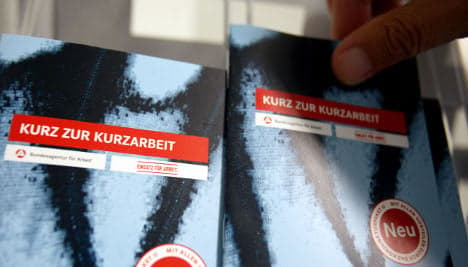Shorter working hours keep lid on joblessness

The Federal Labour Agency said on Tuesday that German unemployment dipped to 7.6 percent of the workforce in November from 7.7 percent the previous month, as government sponsored shorter working hours kept job cuts at bay.
The raw number of jobless, the headline figure in Europe's biggest economy, fell by 13,000 to 3.215 million, the agency added, a sign Berlin's shorter working hours scheme limited fallout from the global economic and financial crisis.
It was the lowest level since December 2008, ING senior economist Carsten Brzeski noted.
"After roughly a year of economic crisis, the labour market remains relatively robust," agency president Frank Weise said. Effects of the recession on unemployment "are markedly less dramatic than initially feared," he added.
The seasonally-adjusted number of jobless workers declined by 7,000 whereas analysts polled by Dow Jones Newswires had expected an increase of 10,000.
German authorities approved last week a 12-month extension of the popular Kurzarbeit scheme which allows firms hit by recession to cut costs by keeping staff at home or shortening their hours but without having to fire them. The state pays up to 67 percent of a worker's salary for a period of up to two years, and the latest data showed around 1.5 million workers were covered by the scheme.
Although Germany has suffered its worst postwar recession, the downturn has not sparked a sharp rise in the number of people out of work.
"It is no secret any more, earlier reforms and, above all, subsidised short-term work have made the labour market more crisis-resistant than during earlier recessions," Brzeski said.
UniCredit economist Alexander Koch added that data was also "dampened due to statistical changes," since unemployed workers undergoing job training by private agencies are no longer counted in the figures.
"Without this effect, the number of adjusted unemployment would have increased by 10,000 in November," Koch said.
But with Germany now pulling out of recession and order books slowly filling up again, unemployment is unlikely to explode even though the number of jobless is forecast to increase going into 2010.
That said, "the downside of the short-term schemes probably is that even with an ongoing economic recovery employment will hardly grow in the next two years," Brzeski commented.
Comments
See Also
The raw number of jobless, the headline figure in Europe's biggest economy, fell by 13,000 to 3.215 million, the agency added, a sign Berlin's shorter working hours scheme limited fallout from the global economic and financial crisis.
It was the lowest level since December 2008, ING senior economist Carsten Brzeski noted.
"After roughly a year of economic crisis, the labour market remains relatively robust," agency president Frank Weise said. Effects of the recession on unemployment "are markedly less dramatic than initially feared," he added.
The seasonally-adjusted number of jobless workers declined by 7,000 whereas analysts polled by Dow Jones Newswires had expected an increase of 10,000.
German authorities approved last week a 12-month extension of the popular Kurzarbeit scheme which allows firms hit by recession to cut costs by keeping staff at home or shortening their hours but without having to fire them. The state pays up to 67 percent of a worker's salary for a period of up to two years, and the latest data showed around 1.5 million workers were covered by the scheme.
Although Germany has suffered its worst postwar recession, the downturn has not sparked a sharp rise in the number of people out of work.
"It is no secret any more, earlier reforms and, above all, subsidised short-term work have made the labour market more crisis-resistant than during earlier recessions," Brzeski said.
UniCredit economist Alexander Koch added that data was also "dampened due to statistical changes," since unemployed workers undergoing job training by private agencies are no longer counted in the figures.
"Without this effect, the number of adjusted unemployment would have increased by 10,000 in November," Koch said.
But with Germany now pulling out of recession and order books slowly filling up again, unemployment is unlikely to explode even though the number of jobless is forecast to increase going into 2010.
That said, "the downside of the short-term schemes probably is that even with an ongoing economic recovery employment will hardly grow in the next two years," Brzeski commented.
Join the conversation in our comments section below. Share your own views and experience and if you have a question or suggestion for our journalists then email us at [email protected].
Please keep comments civil, constructive and on topic – and make sure to read our terms of use before getting involved.
Please log in here to leave a comment.